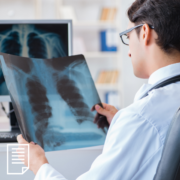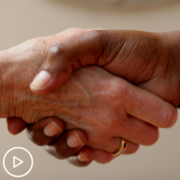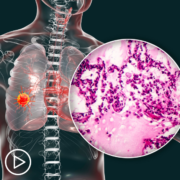Lung Cancer and Coronavirus: What Patients Should Know
Lung Cancer and Coronavirus: What Patients Should Know from Patient Empowerment Network on Vimeo.
Due to COVID-19, many patients with lung cancer must follow new guidelines to receive care. Dr. Tejas Patil provides precautions patients should consider and the role telemedicine plays in lung cancer care.
Dr. Tejas Patil is an academic thoracic oncologist at the University of Colorado Cancer Center focused on targeted therapies and novel biomarkers in lung cancer. Learn more about Dr. Patil, here.
Download Program Resource Guide
See More From INSIST! Lung Cancer
Related Programs:

Deciding on a Lung Cancer Treatment? Essential Testing for Optimal Care |

|

How Can You Access Personalized Lung Cancer Treatment? Resource Guide |
Transcript:
Dr. Patil:
Lung cancer patients are certainly at very high risk of complications from COVID-19. And it’s understandable, especially given the kinds of treatments that patients with lung cancer receive, that there’s a lot of them will wind up having compromised immunity which makes them at increased risk for adverse outcomes from COVID-19. That being said, I think it’s really important that this be balanced with the actual risk of untreated or inadequately treated lung cancer, which is also a major medical concern. What I tell patients is that, at least at our institution, we do everything we can to create an environment that is as safe as possible from a COVID mitigation standpoint.
But at the end of the day, untreated lung cancer can have a very aggressive course, and so making sure that patients understand that as we try to move things to a more telemedicine type approach, that there are some things where you really just have to come and see your doctor. Not everything can be done virtually.
I think telemedicine is helpful for patients who have very stable disease and are on anti-cancer treatment, so specifically a patient on targeted therapy, for example.
A pill once a day. Their last scans show that they’re doing really well. They feel well. They’re exercising every day. That patient, probably we can do a visit virtually and just make sure and check in that there’s nothing new or concerning that’s come up.
The other patient that probably I can see a role for telemedicine is someone who had, let’s say, a Stage 1 lung cancer that was treated with surgery, and we’re just monitoring them on surveillance. That patient probably doesn’t have to come into the clinic to see us. But in general, the thing about lung cancer is that most patients are getting some kind of chemotherapy or immunotherapy and will be coming into an infusion center, and so what I would tell patients is if there’s any new or concerning symptoms, to a very low threshold for seeking an in-person evaluation.










